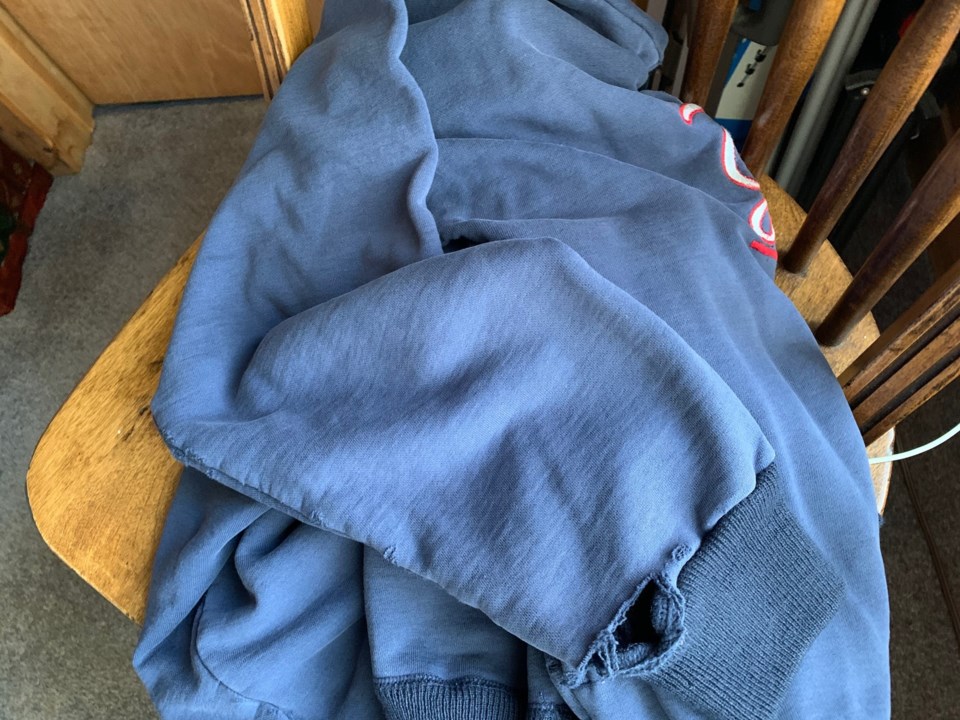That old sweatshirt you've been meaning to toss in the trash may soon be banned from the City's landfill site.
A staff report has been sent to a council committee for study.
It's likely that council will implement an education campaign focused on raising awareness about options for the reduction, reuse, and recycling of textiles.
A ban on the collection and disposal of textiles in the general waste stream may be next.
Al Tomek, Waste Management Coordinator, in a report to council says the average Canadian generates approximately 37 kilograms (82lbs) of textiles a year.
"This waste stream is composed of clothing, drapes, sheets, towels, shoes and other accessories," says Tomek. "A recent trend in the clothing industry is known as 'fast fashion' which has significantly increased the volume of textiles produced and disposed of. Companies are now designing and producing inexpensive clothing designed to be purchased, worn and discarded."
The report explains that the practice has many environmental implications, not only in the production and transportation of clothing (2800 litres of water are required to manufacture one cotton T-shirt) but also from a waste management perspective.
"It is predicted that this ‘fast fashion’ trend will result in a 62 per cent increase in textile waste by 2030. Currently, it is estimated that North Bay generates approximately 1,890 tonnes of unwanted textiles on an annual basis, of which 85 per cent will be destined for the landfill."
Tomek believes North Bay residents have several options for diverting their unwanted textiles from the landfill.
"Items can be given away to family and friends, sold online or at garage sales. There are also a few not-for-profit and for-profit organizations that will accept the items or sometimes are willing to provide a collection service from their homes. There are also a few organizations that provide containers on private property where residents can drop off their goods."
Approximately:
- 25 per cent of donated textiles will be sold for re-use,
- 30 per cent will be sent overseas to be sold,
- 40 per cent are recycled into rags and insulation
- the remaining 5 per cent will be landfilled
Tomek offers some options in his report.
Education
The City of North Bay is currently serviced by numerous non-profit and for-profit organizations such as charity operated reuse stores; charity operated donation containers, second-hand stores, as well as on-demand curbside collection. The City can increase residential awareness through an education campaign delivered through existing communication channels to raise awareness.
Blue Box Collection
Curbside collection is the most convenient option to recycle, which leads to a greater capture rate. The introduction of a textile curbside collection program would see a high volume rate when first implemented but would eventually level off. One negative outcome with a municipal operated curbside program would be the capture of material that previously would have been donated to a charity. Another negative effect is that textiles are a poor fit for municipal blue box programs due to excessive costs and contamination issues. Textiles collected using blue box material trucks would have to be placed in a separate plastic bag to ensure the material is kept uncontaminated from food waste or other contaminates. This not only adds to the plastic bag dilemma but adds cost from a processing perspective as manpower is required to remove the items from the bag. City staff has contacted our current blue box service provider and have been told there is no interest to provide this service at this time.
Service Provider
The City could partner with one or more existing service providers (charity or for-profit vendors) to place drop-off containers at various City-owned properties that would give residents an opportunity to deliver textiles to a nearby location. In order to provide all organizations an equal opportunity in this program, an Expression of Interest document would be required. The document would outline the service level required and how the organization would ensure that any non-textiles, unwanted articles or garbage is cleaned up and properly disposed of in a timely manner. This option would also require those City employees responsible for their specific building/properties to contact the service provider for pick-up and/or clean-up. This option provides most residents with a disposal option however some non-profits organizations may experience a decrease in the volume of material they are currently receiving.
Collection and Landfill Ban on Textiles
The City of North Bay currently has a collection and landfill ban on old corrugated cardboard and a curbside collection ban on electronic products. In both cases, residents are forced to recycle their cardboard and electronics. Both programs operate with little cost except for advertising, as it is the responsibility of the City’s contractor not to collect these items if visible. The City’s current contract permits the City to ban additional material at no cost to the City. It would not be the intention to have waste collectors open garbage bags and visually inspect the contents for textiles, however, should textiles be present in a garbage receptacle; the receptacle would be left with a notification explaining the reason. Residents would then be forced to have their textiles picked up by one of the organizations that provide collection services or be forced to deliver their textiles to an organization that accepts them.
Some municipalities have implemented clear bag programs (all waste must be placed in clear plastic bags) to make the identification of banned materials in the waste stream more visible for waste collectors. Clear bag programs do accomplish better bylaw enforcement, however, it also adds to the problem of a single-use for a plastic product. Also from a landfill perspective, it is more environmentally responsible to have waste not contained in a plastic bag as this leads to a much faster decomposition process.
Tomek recommends the education and landfill ban options.
The report has not been adopted yet but has gone to a committee for discussion. A recommendation will later come to council for a final decision.



.jpg;w=120;h=80;mode=crop)